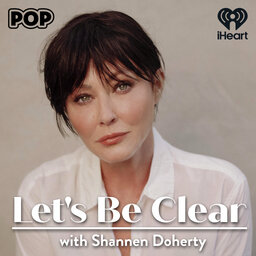Let’s be Collaborative...with James Cullen Bressack
Director and Screenwriter James Cullen Bressack was warned about the “difficult” Shannen Doherty years ago, but he wanted to work with her anyway. What he found was a life-long friend and collaborator. She found in him an unwavering support system on AND off his movie sets. The filmmaker joins Shannen for a hilarious and brutally honest conversation about the movies they’ve made, their ups and downs, and what could be her next role!
In 1 playlist(s)
Let's Be Clear with Shannen Doherty
Let’s Be Clear… a new podcast from Shannen Doherty. The actress will open up like never before in…Social links
Follow podcast
Recent clips

Let's Get Real with Selma Blair and Amanda Kloots
41:24

Let's Find our Second Wind...with Marion Jones
39:09

Let's Find The Prescription for Joy...with Dr. Tiffany Moon
33:00
 Let's Be Clear with Shannen Doherty
Let's Be Clear with Shannen Doherty